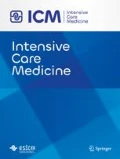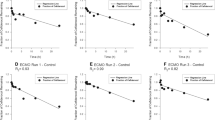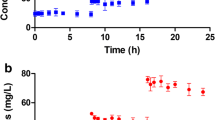Abstract
Objective
Using an ex vivo simulation model we set out to estimate the amount of drug lost due to sequestration within the extracorporeal circuit over time.
Design
Simulated closed-loop extracorporeal membrane oxygenation (ECMO) circuits were prepared using a 1.5-m2 silicone membrane oxygenator. Group A consisted of heparin, dopamine, ampicillin, vancomycin, phenobarbital and fentanyl. Group B consisted of epinephrine, cefazolin, hydrocortisone, fosphenytoin and morphine. Drugs were tested in crystalloid and blood-primed circuits. After administration of a one-time dose of drugs in the priming fluid, baseline drug concentrations were obtained (P0). A simultaneous specimen was stored for stability testing at 24 h (P4). Serial post-membrane drug concentrations were then obtained at 30 min (P1), 3 h (P2) and 24 h (P3) from circuit fluid.
Measurements and results
One hundred and one samples were analyzed. At the end of 24 h in crystalloid-primed circuits, 71.8% of ampicillin, 96.7% of epinephrine, 17.6% of fosphenytoin, 33.3% of heparin, 17.5% of morphine and 87% of fentanyl was lost. At the end of 24 h in blood-primed extracorporeal circuits, 15.4% of ampicillin, 21% of cefazolin, 71% of voriconazole, 31.4% of fosphenytoin, 53.3% of heparin and 100% of fentanyl was lost. There was a significant decrease in overall drug concentrations from 30 min to 24 h for both crystalloid-primed circuits (p = 0.023) and blood-primed circuits (p = 0.04).
Conclusions
Our ex vivo study demonstrates serial losses of several drugs commonly used during ECMO therapy. Therapeutic concentrations of fentanyl, voriconazole, antimicrobials and heparin cannot be guaranteed in patients on ECMO.

Similar content being viewed by others
References
Green TP, Timmons OD, Fackler JC, Moler FW, Thompson AE, Sweeney MF (1996) The impact of extracorporeal membrane oxygenation on survival in pediatric patients with acute respiratory failure. Pediatric Critical Care Study Group. Crit Care Med 24:323–329
Lequier L (2004) Extracorporeal life support in pediatric and neonatal critical care: a review. J Intensive Care Med 19:243–258
Mulla H, Lawson G, von Anrep C, Burke MD, Upton DU, Firmin RK, Killer H (2000) In vitro evaluation of sedative drug losses during extracorporeal membrane oxygenation. Perfusion 15:21–26
Buck ML (2003) Pharmacokinetic changes during extracorporeal membrane oxygenation: implications for drug therapy of neonates. Clin Pharmacokinet 42:403–417
Mehta NM, Halwick DR, Dodson BL, Thompson JE, Arnold JH (2006). Pharmacokinetic considerations during extracorporeal membrane oxygenation – results from an in vitro simulation model. Paper presented at: American Thoracic Society, International Conference (San Diego, CA, USA)
Pennick GJ, Clark M, Sutton DA, Rinaldi MG (2003) Development and validation of a high-performance liquid chromatography assay for voriconazole. Antimicrob Agents Chemother 47:2348–2350
Wishart DS, Knox C, Guo AC, Shrivastava S, Hassanali M, Stothard P, Chang Z, Woolsey J (2006) DrugBank: a comprehensive resource for in silico drug discovery and exploration. Nucleic Acids Res 34:D668–672
Ball D, Tisocki K (1999) PVC bags considerably reduce availability of diazepam. Cent Afr J Med 45:105
Mahomed K, Nyamurera T, Tarumbwa A (1998) PVC bags considerably reduce availability of diazepam. Cent Afr J Med 44:171–173
Airaudo CB, Gayte-Sorbier A, Bianchi C, Verdier M (1993) Interactions between six psychotherapeutic drugs and plastic containers. Influence of plastic material and infusion solutions. Int J Clin Pharmacol Ther Toxicol 31:261–266
Martens HJ, De Goede PN, Van Loenen AC (1990) Sorption of various drugs in polyvinyl chloride, glass, and polyethylene-lined infusion containers. Am J Hosp Pharm 47:369–373
Coffin SE, Bell LM, Manning M, Polin R (1997) Nosocomial infections in neonates receiving extracorporeal membrane oxygenation. Infect Control Hosp Epidemiol 18:93–96
Burket JS, Bartlett RH, Vander Hyde K, Chenoweth CE (1999) Nosocomial infections in adult patients undergoing extracorporeal membrane oxygenation. Clin Infect Dis 28:828–833
Amaker RD, DiPiro JT, Bhatia J (1996) Pharmacokinetics of vancomycin in critically ill infants undergoing extracorporeal membrane oxygenation. Antimicrob Agents Chemother 40:1139–1142
Bhatt-Mehta V, Johnson CE, Schumacher RE (1992) Gentamicin pharmacokinetics in term neonates receiving extracorporeal membrane oxygenation. Pharmacotherapy 12:28–32
Buck ML (1998) Vancomycin pharmacokinetics in neonates receiving extracorporeal membrane oxygenation. Pharmacotherapy 18:1082–1086
Moller JC, Gilman JT, Kearns GL, Sussmane JB, Raszynski A, Wolfsdorf J, Reed MD (1992) Effect of extracorporeal membrane oxygenation on tobramycin pharmacokinetics in sheep. Crit Care Med 20:1454–1458
Southgate WM, DiPiro JT, Robertson AF (1989) Pharmacokinetics of gentamicin in neonates on extracorporeal membrane oxygenation. Antimicrob Agents Chemother 33:817–819
Wyatt RG, Okamoto GA, Feigin RD (1972) Stability of antibiotics in parenteral solutions. Pediatrics 49:22–29
Shanley CJ, Hirschl RB, Schumacher RE, Overbeck MC, Delosh TN, Chapman RA, Coran AG, Bartlett RH (1994) Extracorporeal life support for neonatal respiratory failure. A 20-year experience. Ann Surg 220:269–280; discussion 281–282
Elliott ES, Buck ML (1999) Phenobarbital dosing and pharmacokinetics in a neonate receiving extracorporeal membrane oxygenation. Ann Pharmacother 33:419–422
Dagan O, Klein J, Gruenwald C, Bohn D, Barker G, Koren G (1993) Preliminary studies of the effects of extracorporeal membrane oxygenator on the disposition of common pediatric drugs. Ther Drug Monit 15:263–266
DeBerry BB, Lynch JE, Chernin JM, Zwischenberger JB, Chung DH (2005) A survey for pain and sedation medications in pediatric patients during extracorporeal membrane oxygenation. Perfusion 20:139–143
Hynynen M (1987) Binding of fentanyl and alfentanil to the extracorporeal circuit. Acta Anaesthesiol Scand 31:706–710
Koren G, Crean P, Klein J, Goresky G, Villamater J, MacLeod SM (1984) Sequestration of fentanyl by the cardiopulmonary bypass (CPBP). Eur J Clin Pharmacol 27:51–56
Arnold JH, Truog RD, Orav EJ, Scavone JM, Hershenson MB (1990) Tolerance and dependence in neonates sedated with fentanyl during extracorporeal membrane oxygenation. Anesthesiology 73:1136–1140
Peters JW, Anderson BJ, Simons SH, Uges DR, Tibboel D (2005) Morphine pharmacokinetics during venoarterial extracorporeal membrane oxygenation in neonates. Intensive Care Med 31:257–263
Geiduschek JM, Lynn AM, Bratton SL, Sanders JC, Levy FH, Haberkern CM, O'Rourke PP (1997) Morphine pharmacokinetics during continuous infusion of morphine sulfate for infants receiving extracorporeal membrane oxygenation. Crit Care Med 25:360–364
Rosen DA, Rosen KR, Silvasi DL (1990) In vitro variability in fentanyl absorption by different membrane oxygenators. J Cardiothorac Anesth 4:332–335
Grassi M, Coceani N, Magarotto L (2002) Modelling partitioning of sparingly soluble drugs in a two-phase liquid system. Int J Pharm 239:157–169
Agus MS, Jaksic T (2004) Critically low hormone and catecholamine concentrations in the primed extracorporeal life support circuit. Asaio J 50:65–67
Acknowledgements
This study was funded in part by the CHMC Anesthesia Foundation, Inc.
Author information
Authors and Affiliations
Corresponding author
Rights and permissions
About this article
Cite this article
Mehta, N.M., Halwick, D.R., Dodson, B.L. et al. Potential drug sequestration during extracorporeal membrane oxygenation: results from an ex vivo experiment. Intensive Care Med 33, 1018–1024 (2007). https://doi.org/10.1007/s00134-007-0606-2
Received:
Accepted:
Published:
Issue Date:
DOI: https://doi.org/10.1007/s00134-007-0606-2




